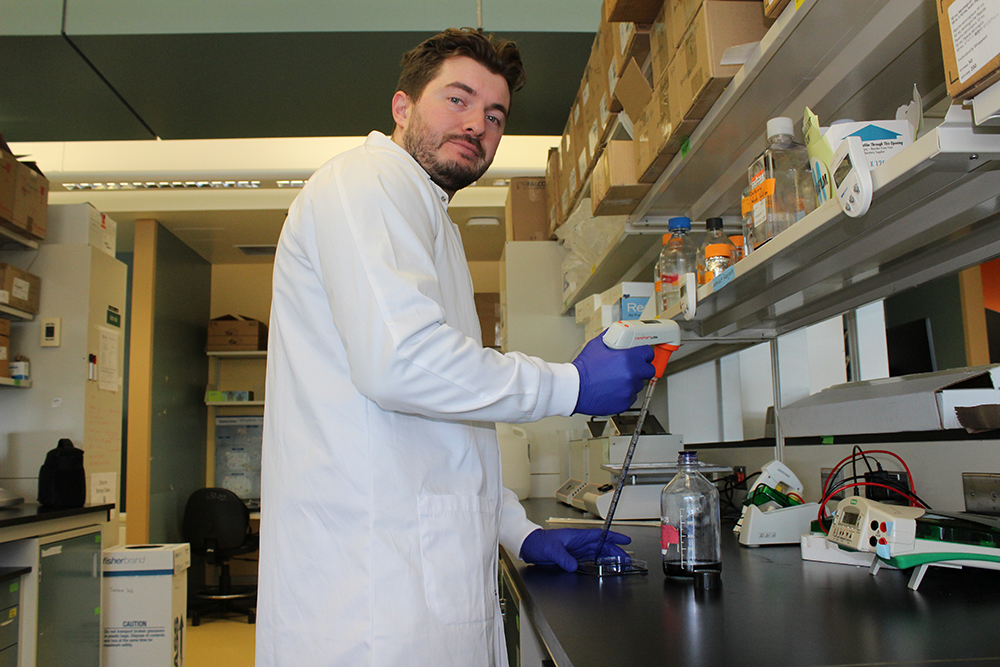
Benjamin Bydak looking at protein expression in pancreatic beta cells.
Rady grad student profile: Benjamin Bydak investigates cell-to-cell communication in Type 2 diabetes
After Benjamin Bydak graduated with his first degree, a bachelor’s in psychology, he decided to take his passion for exercise and helping others and pursue a career in kinesiology.
He enrolled in the bachelor of kinesiology program in 2017. In 2019, he began working as a research student with Dr. Ayesha Saleem, associate professor in the Faculty of Kinesiology and Recreation Management and a principal investigator at the Children’s Hospital Research Institute of Manitoba.
Bydak then moved on to the master’s of kinesiology program, graduating in 2022. Today, he is working toward a PhD in UM’s applied health sciences program.
Earlier this year, Bydak, 30, received $17,850 in funding from Research Manitoba for a project titled Biogenesis and functional effects of extracellular vesicles in senescent pancreatic β-cells.
UM Today sat down with Bydak to learn about what motivates him and his experience as a PhD student.
How did you become interested in kinesiology?
I wasn’t sure about what I wanted to do when I got my arts degree. I knew I was passionate about exercise, so I thought about personal training and that led to kinesiology. I thought with kinesiology and a psychology degree, I could work with people outside the general population with certain clinical conditions and diseases. That really appealed to me.
You recently received funding from Research Manitoba for your project looking at extracellular vesicles. How did it feel to receive this funding?
A lot of work goes into applying for funding for research projects, so it’s very humbling and exciting to receive funding from Research Manitoba. It’s further recognition of the importance of this project and motivates me to work hard. I would like to thank my supervisor, Dr. Ayesha Saleem, and everyone in the Saleem lab for their constant help and support.
Can you describe this project and why you see this research as being important?
My supervisor’s lab focuses on cell-to-cell communication. Cells in the body essentially send messages to each other, and one of the ways they do it is through nanoparticles called extracellular vesicles. I’m currently working with pancreatic beta cells, which are responsible for producing insulin and are very relevant to Type 2 diabetes. We’re looking at how cell-to-cell communication is different with Type 2 diabetes and how to improve this communication.
The main reason this is important is because of the prevalence of Type 2 diabetes, especially in Manitoba. Obviously, insulin therapy is effective for managing this disease, but if we can figure out other ways to help the cells in the pancreas to be as healthy as possible, then we can discover other ways to address it.
What motivates you to do the work that you do?
I have an intrinsic interest in learning more about cell-to-cell communication. Beyond that, it is very motivating to be a part of academia and contribute to a growing understanding of cell-to-cell communication in the context of Type 2 diabetes.
What has been the most rewarding part of your time at UM?
I’d say what I’m working on right now. I really like being involved with teaching new students who come into the lab. This year we have two summer students, but that can vary each year. Last summer, every senior student had their own summer student to work with. I enjoy the process of seeing someone come into research for the first time. They don’t know what to expect, and then they learn about what our lab does, about research in general, and it’s exciting to see them grow.
What are your plans once you finish your PhD?
When I initially went into grad school, I really wanted to be a professor, but I’m also exploring what other options are available to someone with a PhD in this field. There are people who left academia and work in government or biotech companies, for example. I’m curious about what they do.
This Q&A is part of a series on UM Today this summer featuring Rady Faculty of Health Sciences graduate students. You can find more grad student profiles here: #Radygradstudents.






